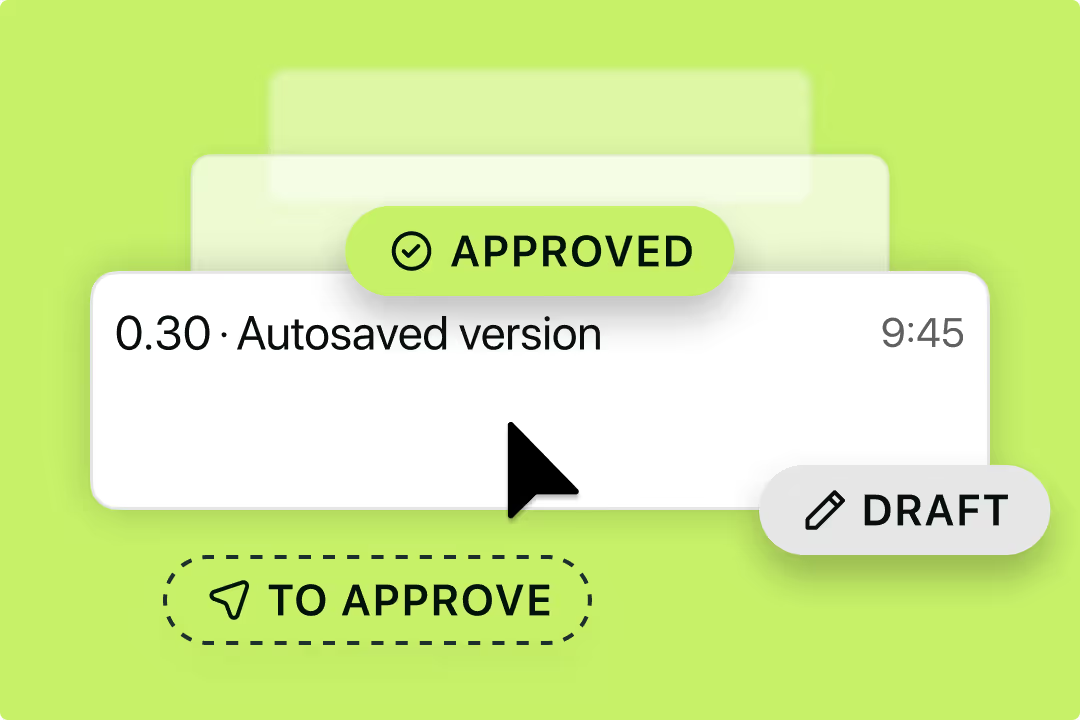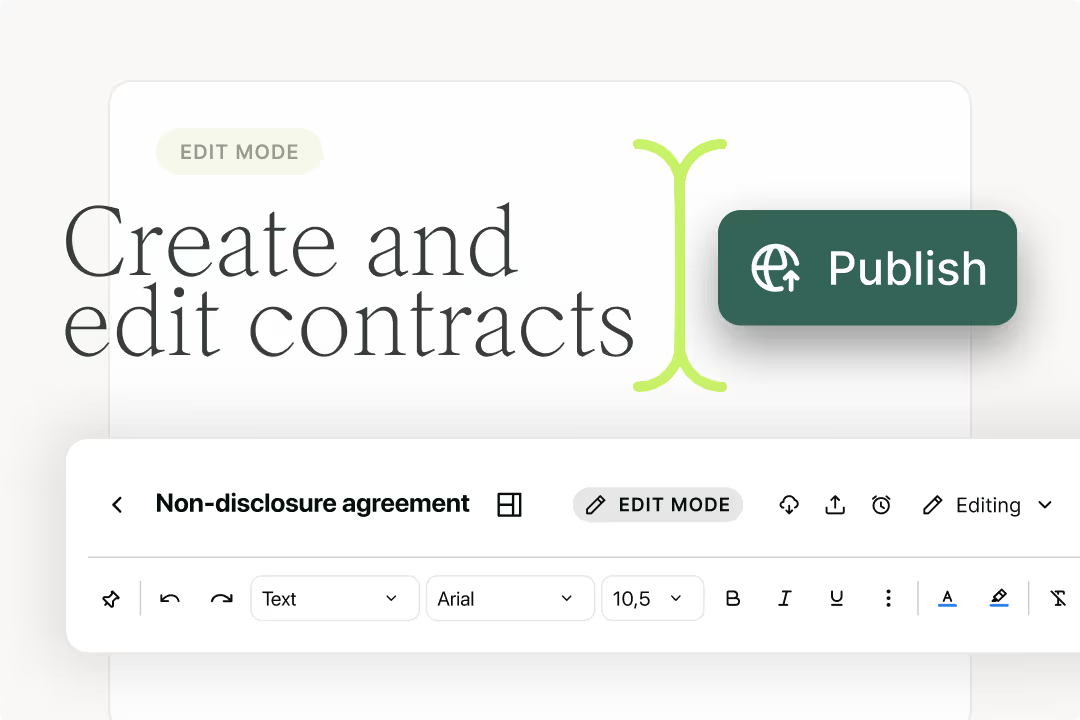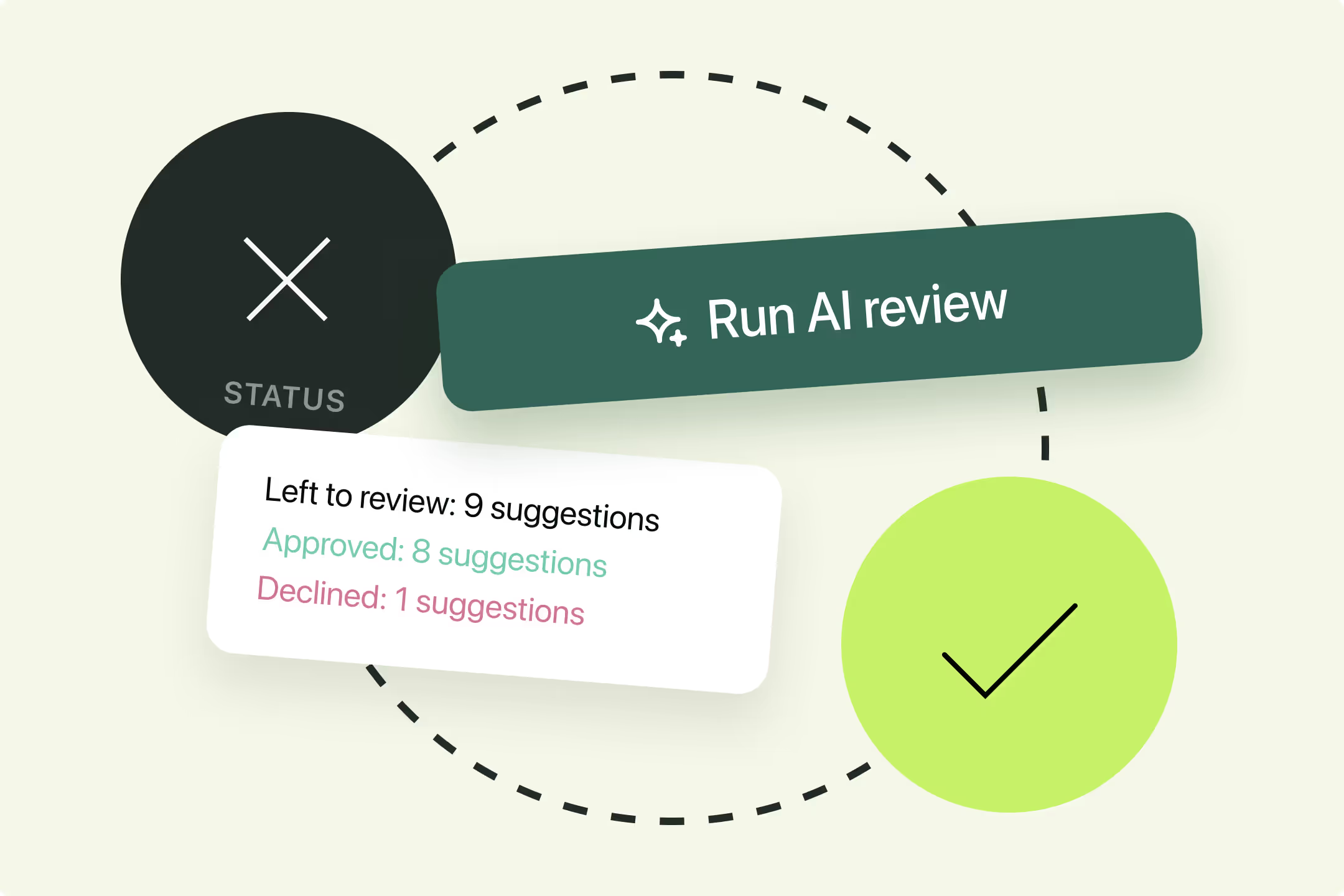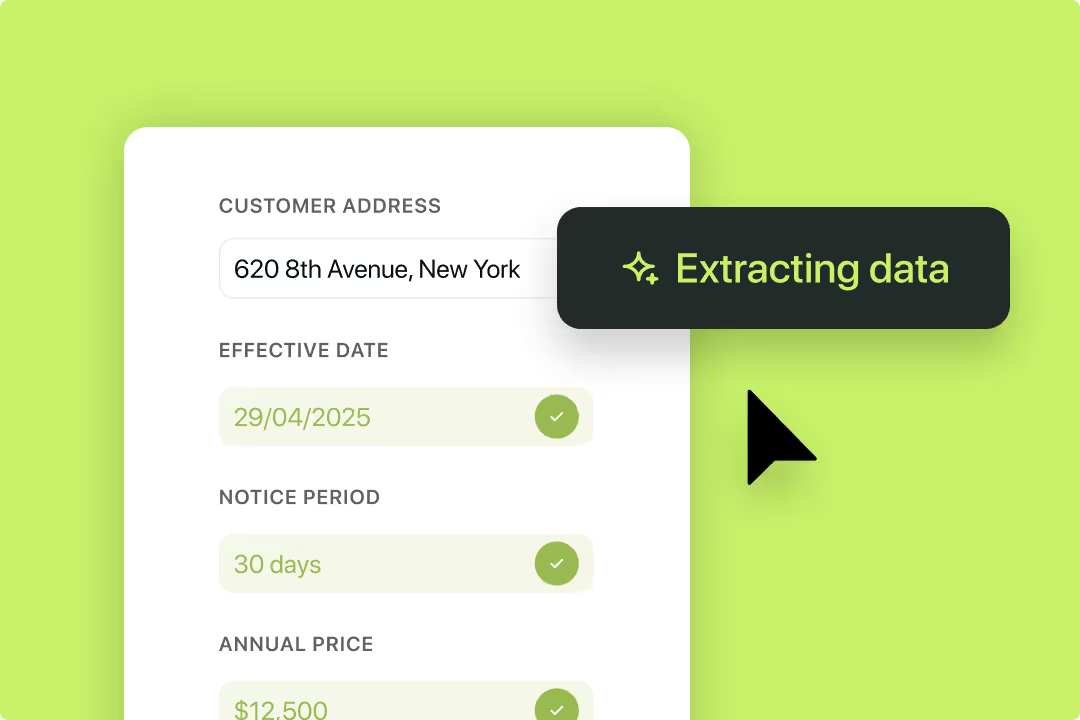Solutions
Customer Support
Resources
Lawyers are often a smaller, more expensive function than other areas of the business. That means that, for the rest of the business to function effectively, lean legal teams need to have the resources to enable the wider team. That's where self-service contracts come in, as departments can negotiate and send out contracts for signing without needing significant legal time.
But before we dive into that, what is a self-serve workflow, and how can it help scaling businesses close deals more efficiently? Otherwise let’s find out more about self-service contracts in this deep-dive.
A self-serve contract workflow is an approach to contract management where different departments are enabled to set up, negotiate and agree contracts without needing significant input from in-house legal teams.
Usually reserved for low-value and routine contracts, a self-serve workflow enables commercial teams and others in the wider business to create watertight contracts without wasting legal’s time on repetitive work.
Within a self-serve workflow, the legal team will typically create contract templates for different teams to edit and use, set up the appropriate approval flows and lock certain terms and fields to empower commercial teams to process contracts with minimal risk.
Of course, most self-serve contract workflows will still rely on legal for a final approval, but a self-serve contract is designed to help legal teams enable other departments, instead of blocking them.
Whilst legal teams are typically the ones bogged down with contract drafts, amendments, negotiations and reviews, certain contracts can actually be self-served on by other departments, so long as the right safeguards are in place.
In fact, in a scaling business where targets are especially aggressive, empowering teams to self-serve on contracts can ensure that deals are closed more quickly and efficiently, without burdening already busy legal teams. But who can self-serve on a contract, and when?

Well, there are a few teams that a self-serve contract workflow might benefit. These include:
It's common for salespeople such as account executives and sales managers to self-serve on certain contracts, since their main responsibility is securing signatures on agreements like MSAs and SaaS agreements as quickly as possible. Their focus in negotiations will often be on commercial terms like price, billing manner and frequency, number of users, and so on.
Given this high level of involvement, it makes sense for sales teams to self-serve on these contracts and cut out any inefficiencies created by the manual, non-self-serve process.
The finance and revenue operations teams will want to be in the loop when it comes to headline terms, and they tend to be responsible for authorizing spend on each specific agreement.
Since their input is so critical in the contract process for supplier agreement templates and channel partner agreement templates, for example, finance teams are also well placed to self-serve on these contracts and reduce the time wasted for legal.
See how self-service contracts can enable finance teams on this page.
The people team will be heavily involved in the contract process for certain simple contracts that determine employee terms. For example, the people team is responsible for distributing option agreements to new and current employees. They also work with legal to make changes to option arrangements as the business scales.
Similarly, the HR team is usually in charge of creating and sharing offer letters with potential candidates. For agreements like these, speed and efficiency is key, since a delay can result in a candidate looking for or accepting an employment offer elsewhere.
When people teams are empowered to self-serve on these types of contracts, they can eliminate any delays and agree terms faster, which enables them to capture the right candidates at the right time.
If you use a HR system like Ashby or Greenhouse, check out how their integration with Juro can empower your HR team to create offer letters and contracts in the system they love.
With supplier or vendor agreements especially, it is common for the procurement team to own the purchasing process and negotiate commercial terms between the buyer and supplier.
As a result, procurement teams, when given the right tools, can effectively self-serve on contracts to get these all-important deals closed more quickly.
An SaaS agreement is the commercial contract that sets out the formal relationship between the SaaS company and its customer. It may take the form of a contract covering a pilot or trial period, or it might be an order form for an auto-renewing annual subscription. However, despite their differences, these contracts do facilitate the exchange of services to the customer for recurring revenue to the business.
Since SaaS companies are often scaling fast, suffering the manual, labour-intensive process and experiencing delays within the legal team can threaten the aggressive growth targets they have set. By empowering teams to self-serve on SaaS agreements, businesses can reduce friction between teams and give salespeople more control and oversight in the SaaS agreement process.
In a channel partner agreement, two businesses set out and agree the terms of their commercial partnership. An example of a channel partner agreement is the contract between two SaaS companies, whereby one party agrees to include the other in its marketplace or to provide referral traffic in exchange for a percentage of any revenue that this generates.
Many businesses derive a significant portion of their revenue from partnerships, like the Salesforce AppExchange, the Slack app directory or the HubSpot marketplace. These arrangements are governed by channel partner agreements, which codify the revenue relationship between the two parties.
Whilst forging these new partnerships should be one of the happiest moments for businesses, they can often become a headache for legal teams that adhere to the manual process. Unlike a manual process, allowing partnerships managers to self-serve on channel partner agreements means that legal teams can spend more time working on high-value strategic work.
Read how Zeno Capucci empowers his wider team to self serve on certain contract types in this blog post.
A master services agreement (MSA) sets out most of the terms that will govern the commercial relationship between a business and its customer. This type of contract is common in high-velocity sales organizations, like SaaS businesses, as it means reps can send out order forms that include key commercial terms for quick decisions, with the much more detailed legal terms appended in the MSA.
Since MSAs can often be the final hurdle for sales teams, enabling them to self-serve on these kinds of business contracts is vital to closing deals quickly and efficiently. A successful self-serve setup empowers commercial colleagues to create an MSA whenever they need one, without having to ask the legal team or worry about the version and terms within it being up to date. And legal teams can be confident that everything is how it should be.
Software licence agreements are contracts that offer a person or a business the right to use software that legally belongs to someone else. These agreements help businesses control the use of their software, protect legal ownership and build commercial relationships between both parties.
More often than not, software licence agreements come in the form of standardized contracts and can very easily be self-served on as a result. This is because, for B2C transactions especially, there is little scope for negotiation. In fact, even for B2B contracts, deviations from standard terms will be relatively uncontroversial and can often quickly be agreed to get deals over the line.
An option agreement outlines the terms and conditions that give a party a right to buy an asset. The term ‘option agreement’ is used in many different contexts – from financial derivatives to property transactions – but where we see options agreements discussed most frequently is in relation to the contracts that startups and scaleups use to give share options to their employees.
Option agreements for shares are a great way to give employees a stake in the company’s commercial success, and to align employee and business incentives. However, the process for designing, negotiating and agreeing option agreements can be clunky in businesses where people and talent teams are unable to self-serve. That’s why option agreements are the perfect type of contract to self-serve on, particularly in businesses where commercial headcount is skyrocketing, but the legal team isn’t growing at the same rate.
Supplier agreements outline the terms of a commercial relationship between buyer and supplier. These types of contract, also referred to as buy-side agreements, commit both parties to do business with each other over a specified period.
Typically, the supplier will generate an agreement and email it to the buying party. In the earlier stages of a business, the agreements created will likely be saved and reused later on as a template. But without a central source of truth there’s a high chance that teams use outdated versions.
An offer letter is a document sent to candidates for a role who have been offered the position. The offer letter gives the candidate basic information about the role, but it also includes details on the salary, terms and conditions, start date, and more.
It's a touchpoint for negotiations between the candidate and the employer. You might follow up with further details in a separate, lengthier and more formal employment contract.
Since every offer letter is different, hiring teams in a non-self-serve workflow will often need to manually input information into each one. Then, they will have to send emails back and forth to legal and HR teams to agree on a final draft.
This friction and back and forth between teams can slow down an offer letter’s turnaround time, which can impact a candidate’s experience negatively and - at worst - cause them to accept someone else’s offer first.
Giving colleagues the ability to self-serve can streamline the offer letter process, reduce time-to-hire and free up the hiring team so that they can concentrate on the things that really matter. It puts them in the driving seat and means that when hold-ups happen, they can spot them and smooth things along.
Closing deals should be one of the happiest moments in a company’s life. But with a manual, non-self-serve workflow in place, that’s unfortunately not always the case. We regularly see the same problems with non-self-serve workflows: jumping between multiple systems, legal teams buried in admin work and lost contract data. How can a self-serve workflow help to resolve these issues? Here are just a few of the benefits of self-serve contracts:
Without self-serve contracts, commercial colleagues will need significant input from legal - often on low-value work like hunting for documents they’ve provided many times before. With a self-serve workflow, sales teams and others in the business can create watertight contracts without wasting legal’s time.
Instead, your legal experts can get back to strategic, high-value work that really adds value to the business.
{{quote1}}
The use of multiple tools in a non-self-serve workflow makes version control challenging and increases the risk of lost data along the way, as information doesn’t survive transitions between systems.
This slows down negotiations. With a self-serve process handled by one system, legal can review contract activity or and previous versions of the agreement to see what’s been negotiated or changed and why, making approvals and audit trails easier and allowing businesses to extract critical data from their contracts.

Manual, non-self-serve workflows for contracts create friction between teams. The sales team can’t close deals as quickly as they would like because they are waiting for legal to review and approve the contract. Meanwhile, the legal team would like nothing better than to reduce their involvement.
A self-service workflow can do just that, streamlining the process so that sales (and other commercial teams) can close deals faster.
In a manual process without self-serve, data can get lost as the document moves from system to system, and as new versions get created. This makes it hard to work out what changes were made when, by whom and why, hard to spot bottlenecks and hard to manage the contract post-signature.
A self-serve workflow gives everyone who needs it visibility across the contract lifecycle and creates an audit trail of contract activity, as well as access to vital contract metrics.

In short: a successful self-serve setup empowers anyone in the wider business to create a contract whenever they need one, without having to run it past the legal team first. When you choose to self-serve using a sophisticated contract automation solution designed with legal in mind, legal counsels can begin to enable commercial teams, rather than block them.
Unsure where to start with your self-serve contract workflow? Fear not. An effective self-service workflow will probably require the following things:
If self-serve is really going to work, then all contract creators need to be able to easily use and navigate through their contract solution – otherwise they’ll be asking legal for help all the time, re-introducing the friction that this process was supposed to remove.
Created by the legal team using their contract collaboration platform’s template editor, your team’s contract template should codify the most up-to-date thinking around terms, clause language, commercial positions, and so on. It should also be well designed and easy to sign. Find out more from the legal design experts.

If you're looking for contract template inspiration, check out our free to download template collection.
A Q&A flow captures the key data that might vary between contracts. This is best handled with a natural language Q&A, with questions like “What’s the counterparty name?” and “What’s the effective date?” Using a natural language Q&A workflow, contract creators (i.e. salespeople) can autopopulate the agreement with all the relevant information just by answering these questions, minimizing the risk of discrepancies and human error.
If counterparties want to make changes to a contract, it defeats the purpose of self-serve if this has to happen in Word, over email and by telephone. Find a solution that offers negotiation and commenting in-browser. That way, audit trails and version histories are all in one place.

Although commercial colleagues will be empowered to serve their own contracts, you’ll still want legal to have sign-off - even just for peace of mind. Using an approval workflow means that you can give the legal team approval rights before contracts are shared with counterparties – just to be safe.
Contracts above a certain value might have more flex to deviate from standard terms. A contract collaboration platform that allows you to tag your agreements with metadata, such as value, will make it easier for different teams to store and manage these important documents.

If you’re looking to create a self-serve workflow to take the friction out of legal agreements, you will find the following features useful:
Fortunately, a strong contract management software or contract automation platform will typically offer you all of this functionality, making it quick and easy for legal to enable their business colleagues on contracts.
Is the back and forth between legal and sales teams a pain point for contracts in your business? Is your company or marketplace growing so fast that the contract process is out of control, with friction pre-signature and a lack of visibility post-signature? Is your legal team feeling the pressure of managing scaling contracts?
If so, hit the button below to speak to a specialist about how you can create a self-serve contract workflow with Juro.

Lorem ipsum dolor sit amet, consectetur adipiscing elit. Suspendisse varius enim in eros elementum tristique. Duis cursus, mi quis viverra ornare, eros dolor interdum nulla, ut commodo diam libero vitae erat. Aenean faucibus nibh et justo cursus id rutrum lorem imperdiet. Nunc ut sem vitae risus tristique posuere.

